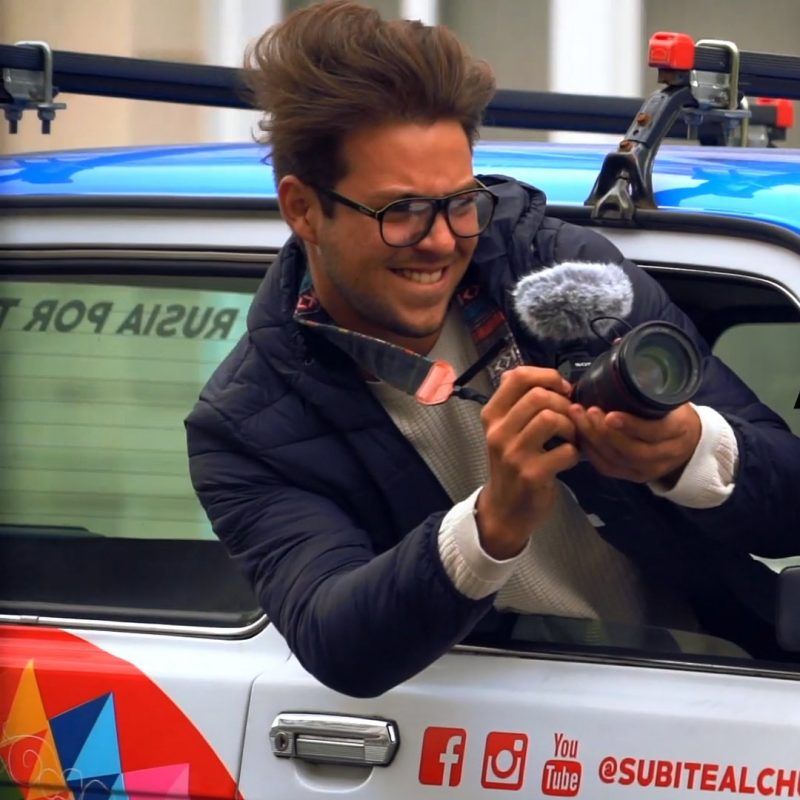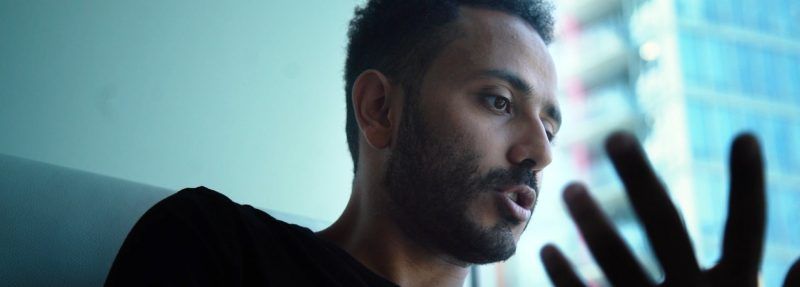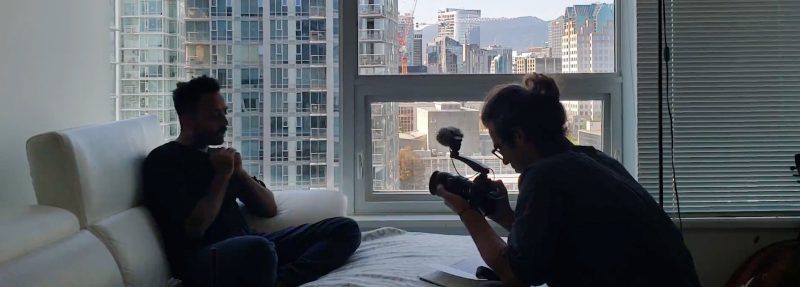Andrés Bronnimann is an award-winning filmmaker, director, and producer whose work in documentaries, commercials, music videos and more has taken him around the globe to shoot in over 30 countries at the young age of 26. Originally from Costa Rica, born to a Mexican mother and a Swiss father, Bronnimann grew up as a biracial child to migrant parents, exposed to multiple cultures and beliefs, all while forming his passion for film. He studied filmmaking at college in Florida, where he met his roommate and eventual best friend Emad Al-Maqtary, a Yemeni refugee. All of these experiences led Bronnimann to question the urgent topic now discussed around the world: human migration.
In his debut documentary film, The Universality of It All, Bronnimann tells his story by mixing stunning visuals of coastal cliffs and aerial shots of small towns, headlines and clippings of articles that illustrate the global issue, and in-depth and touching interviews with migrants whose lives are being subjected to debate. He reports on this complex and dividing issue in a way that’s seldom been done before: by focusing not just on the statistics, but on the people who are migrants and/or refugees, too. Bronnimann’s heart-wrenching interviews with Nicaraguan refugees who fled to Costa Rica will stay with the audience for months after the credits roll—as well as his interview with conservative Americans in Florida who vehemently oppose immigration.
Viewers of this documentary learn alongside Bronnimann. We watch the protests on both sides of the debate unfold, feel the pain of the refugees who have lost their homes, question our own country’s stance on immigration. And while examining his friendship with Emad and how their stories were fated to converge, Bronnimann realizes that the most pressing concerns of our time—migration, social and economic inequality, xenophobia, political polarization, and climate change—are all connected, whether we want to acknowledge this truth or not.
Bronnimann sat down with Honeysuckle to explain more about his first feature-length film, the ongoing issues around human migration, and his approach to the craft of filmmaking.

HONEYSUCKLE MAGAZINE: What is The Universality of It All about?
ANDRES BRONNIMANN: My film is about human migration and its connection to different social issues around the world, such as economic inequality, climate change, xenophobia, etc. Essentially it's an introspection into the topic and it analyzes how [migration] connects to all these different subjects that you normally wouldn't relate it to. It's told through the story of me and my best friend—a filmmaker and a Yemeni refugee—the two of us making sense of the world.

What made you want to create a film about these issues?
The first idea was just human migration. I started early without that much knowledge on the topic and, as I learned more about it, I realized that migration is not really about migration. Migration is the result of a lot of issues combined. It's not the issue itself. You cannot reduce it by accepting or not accepting migrants; the issue isn’t just people moving. There are many [factors] for migration. One reason is due to climate change, [another is] inequality and wars in different countries, and so, when I started the film, I looked at the Middle Eastern migration to Germany, the North African migration to France, and as I looked at it more closely, I realized that there are certain aspects connecting everything. I decided to focus on those connections, and that led me to the realization that If I really wanted to understand migration, I needed to understand the root causes of migration. That's why the film's title is The Universality Of It All, because it really encompasses everything relating to, and causing migration.
Another reason that I'm interested in migration is because of my parents. My dad is from Switzerland and my mom is from Mexico, and I was born and raised in Costa Rica. Because my parents are migrants, I was pleased to learn more about this topic because I've always felt somewhat like a migrant too.
In The Universality of It All, you mentioned that you've been interested in film ever since you were a kid. How did you stumble into film and what inspired you to take up this profession?
I really don't know why! It's just something that I loved ever since I was very little. I love movies, and I asked my parents for my first video camera when I was six years old, a tape recorder. I started making movies and never stopped. Now, it's almost the same as when I was a kid, only the equipment is better, the stakes are higher, and the budgets are bigger! It's the same process, just with different goals essentially. But I still feel like I'm that little kid with a camera.
One of the most engaging aspects of The Universality of It All was how you went from the personal—your friendship with Emad—to the more universal experience of migration worldwide. What led you to make this powerful connection and basically go from the microcosm to the macrocosm?
That is the effect that I want to have! I want people to have that thought process and see the macrocosm in the microcosm. In order for that to happen, people need information. By the end of the film, I hope I’ve inspired people to look at the world a little differently. In that way, the film is really also an exercise in learning how. If I was able to find how issues like climate change, the war in Yemen, and the [2016] election in the U.S. affected my friendship with my best friend, then I can find it anywhere. That's what the call at the end [of the film] is for: I hope that people—especially young people—see how these issues affect their own lives.

This film took nearly two years to complete and you were the only crew member! Can you talk about the experience of filming and directing, and how you undertook completing this huge project by yourself?
It was hard doing it all by [myself]! This is my first film straight out of college essentially, so I didn't find that much support with financing. Before I worked on it to some extent, I thought, “I cannot sit down and wait for funding to come, I need to go ahead and do it myself,” and it's something that I felt so strongly about. I was not going to wait and do some other projects. I knew I could raise money for this. And that's one of the reasons also why many of the creative decisions that you see in the film—like making it about my best friend, filming our story and shooting the microcosm to understand the macrocosm—are very low-budget ideas that came to me because of the lack of funding. And it was hard. There were days that I felt like I was not going to finish it. So it feels so good that it’s completed now.
And I’m happy with more than just the film itself, I’m happy with the story that I’m telling. The thing that took me the longest was the research part and truly coming to grips with what I wanted to say. I didn't want to just say what everybody was saying, I didn't want to say something that is commonly discussed. That’s why I read a lot of reports by policymakers today, to try to make sense of this topic. After knowing what I wanted to say and once I had the trajectory of the film, everything was easier. You can put the film together, get some footage here, get some interviews there, that's not the hardest part. I think the hardest part was the conceptual ideas, and coming to terms with what I wanted to say.
A lot of people say that they liked it more [watching it] the second time, or they told me that they need to watch it again because there's so much information. I think that probably in a few years, the film will acquire a little bit more relevance because in terms of style, it has so much information. I think viewers nowadays are used to receiving so much information—I’m not sure if that’s the case in the form of a movie—and I think more and more you're going to see films that have a bunch of information and the viewer has to be the one that takes it in and figure out what it means to them.

In The Universality of It All you interview people all around the world, from wildly different backgrounds, viewpoints, and political leanings, such as conservatives who oppose migrants, as well as people living in makeshift towns who are migrants themselves. Yet the questions you ask all of your interviewees are very compassionate and come from a place of wanting to learn, not exploit. What was the interviewing process like for you, and did it surprise you at times?
Yes, and I think I was surprised in a good way. I wanted to learn and not be judgmental, because 50% of us are on one side of the political spectrum, and 50% of us are on another side, so you cannot just demonize one side. I wanted to [conduct] these interviews with humility, and from a place of wanting to understand. The interview process was just as eye opening for me as it may be for the viewer. It opened my mind to what migration meant. There were some interviews that changed the whole documentary because I learned something new. There was one interview that went on for an hour and a half, and the interviewee said at one point, “I think you got too much!” But for me, I wanted to learn so badly, because what I believe personally is irrelevant, it isn’t important. I wanted to hear what other people had to say and hear their stories because that’s what's important.
You’ve said that 21st century audiences are used to absorbing vast amounts of information very quickly, so in your film you work to fulfill all those needs by incorporating a mix of styles, techniques, and storylines. What were some of the challenges in fitting so much into one film, and how did you make it so successful and powerful?
I think the hardest part was that I had a sea of information, so finding the right track was difficult. If I started without an end goal, then I could’ve easily lost track of what I wanted to do with this film. And I think what made it engaging was the fact that I was able to mix dense amounts of information and juxtapose it with the story of me and my best friend. Having intimate moments mixed with complex information, and then seeing how that information takes place in our lives and out in the real world.
Because of my personal relationship with my friend, there’s a balance that you get throughout the whole film. There’s the information, the audio visual medium, and there's so many opportunities to deliver information. We delivered information through sound, what people are saying, what we’re shooting, etc. so every shot that’s chosen in the documentary in the whole film is a collage that resembles what I'm discussing to truly get some points across. For example, when I talked about the effects of climate change, I put footage of what those effects actually look like.
When I discussed poverty, I wanted to focus on some of the slums and and homelessness that exists, both in Latin America and in Europe, and I interlaced footage of high skyscrapers to represent a capitalist society—I played with a lot of symbols. For me, it’s about delivering information in a different way. Even though it's a lot of information, I still believe that what I was able to accomplish is to make the information accessible for the audience. Because my film is dense, yes, but if you look at the reports, those are hundreds of pages! I wanted to review these and summarize all of this important data that people need to know—that many people don't know—in one film. That was my goal.

How has this been different from projects you've worked on in the past, such as commercials and music videos?
The fact that this film was 90 minutes, and all of the previous projects were only a few minutes long. And the fact that I was also the narrator of the film. What I say is a representation of me. In 20 years, I don’t want to be ashamed of what I said! I want to be on the right side of things, so to speak. So, I think that was the most challenging part, because when you're making a film where you're not the one narrating and you're not the one expressing your point of view—you are still expressing your point of view to a certain extent, through the medium, the actors, and script—but when you're putting yourself out there, when it's your voice and it's your way of thinking and its political, the whole time I wanted to be really sure that what I said was right. If you're not the one saying it, if you're the one directing it, to some extent you're not as connected to the message that you're saying. Personally, I think that just because a director makes a violent scene doesn't mean that he advocates for violence. But if I start expressing my opinion openly in my own voice, then it’s clear that I’m advocating for or against something.

Absolutely. For example, your warning about climate change and how it will spur the largest migration of our time is very powerful and very true, as well as your statement about how we must focus more on climate adaptation than just climate mitigation. Do you think you'll do an entire documentary about this urgent topic? We got a little about it in The Universality of It All, but there's so much more that could be said.
This is a topic that I got into in the last stages of my research, and like I state in my documentary, I think that this will be the most defining issue of our time. And this concerns everyone, whether people believe that climate change is made by humans or not. It’s a whole debate that doesn't really matter, because climate change is still going to happen at this point. So, how do we prepare for that, now that it will happen? And, of course, how do we reduce and recycle and do all the things that we need to do in order to try our best to mitigate what is already going on, which is pretty bad. I definitely think that people have not made the connection between climate change and migration. I think some people may think, “You're mixing two topics that have nothing to do with one another!” But it's known that the main thing that will provoke migration is climate change. It’s going to have the biggest impact on migration patterns in the next few years. If people don't start making the relationship between migration and climate change and economic stability, they won’t see that this will cause the biggest political commotion in many countries.
It's not only about migration, it's about the fact that climate change will have such an impact on society itself. We need to warn people without being completely alarmist. I think we're coming to a point where we need to point out the impact that climate change is having, and show the issues that have risen because of it. And if I can be part of that conversation, I'm going to!

There are already islands in the Pacific whose populations are planning to move because of climate change. They are facing salt intrusion on their land, meaning that they can no longer grow crops, even way inland. People are having to leave their ancestral homes before their land is completely inhabitable.
It’s interesting you bring up these islands in the Pacific, because originally, I wanted to go all over the world to shoot footage and interview as many people as possible for this documentary. One of my ideas was to go to the Maldives, because I have some friends there working on the issue of climate migration. The government is already admitting that they’re sinking and that they’ll probably have to move to New Zealand or somewhere else soon. It's gonna happen. It is happening!
The Universality Of It All was recently screened at the Socially Relevant Film Festival, where it won the INDIEPIX Vision Award as well as the Special Jury Mention for a Documentary Feature! Congrats! So what's next for you? Do you have any other upcoming projects?
Thankfully, with the INDIEPIX Award, there's an opportunity for distribution so I’m very excited to have a larger audience soon! I’m still working on several different projects, so I don't know when my next feature length project will be out. But in the meantime, I will always make content that I find to be of social importance to some extent, and to mix that relevance with entertainment. My newest project is a Costa Rican based documentary series, and it will be screening this month. It’s called Una Mirada Hacia Adentro, meaning A Look Within.
In the meantime, what can readers do before your films are ready to be screened and distributed?
They can follow me and visit my website! And I really hope that people enjoy the film, I made it with passion and dedication. I hope people that watch it know that they are getting reliable information that they can use for their decision making at some point in their life. I hope people can relate to the story of me and my best friend and view migrants with more empathy and humanity as a result of this. If my film can do that, I’ll be happy.



